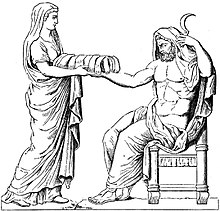Rhea (mythology)
| Rhea | |
|---|---|

Rhea presenting Cronus the stone wrapped in cloth.
|
|
| Consort | Cronus |
| Parents | Uranus and Gaia |
| Siblings |
|
| Children | Poseidon, Hades, Demeter, Hestia, Hera, Zeus |
| Roman equivalent | Ops |
Rhea (/ˈriːə/; Greek: Ῥέα, Greek pronunciation: [r̥é.a͜a]) is the Titaness daughter of the earth goddess Gaia and the sky god Uranus, in Greek mythology and sister and wife to Cronus. In early traditions, she is known as "the mother of gods" and therefore is strongly associated with Gaia and Cybele, who have similar functions. The classical Greeks saw her as the mother of the Olympian gods and goddesses, but not as an Olympian goddess in her own right. The Romans identified her with Magna Mater (their form of Cybele), and the Goddess Ops.
Most ancient etymologists derived Rhea ('Ρέα) by metathesis from έρα "ground", although a tradition embodied in Plato and in Chrysippus connected the word with ῥέω (rheo), "flow", "discharge", which is what LSJ supports. Alternatively, the name Rhea may be connected with words for the pomegranate, ῥόα, later ῥοιά.
The name Rhea may ultimately derive from a pre-Greek or Minoan source.
Cronus sired six children by Rhea: Hestia, Hades, Demeter, Poseidon, Hera, and Zeus in that order. Apart from Zeus, he swallowed all as soon as they were born, because he had learned from Gaia and Uranus that, as he had overthrown his own father, he was destined to be overcome by his own child. When Zeus was about to be born, however, Rhea sought Uranus and Gaia to devise a plan to save him, so that Cronus would get his retribution for his acts against Uranus and his own children. Rhea gave birth to Zeus in Crete, and saved him by handing Cronus a stone wrapped in swaddling clothes, which he promptly swallowed. Rhea hid Zeus in a cave on Mount Ida in Crete. Her attendants, the warrior-like Curetes and Dactyls, acted as a bodyguard for the infant Zeus, helping to conceal his whereabouts from his father.
...
Wikipedia
